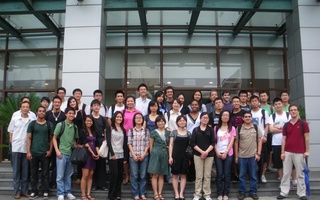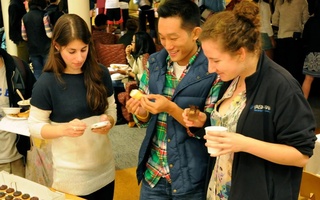The World Expo, which is being held from May 1 to Oct. 30 in Shanghai this year, is yet another majestic display of China’s fast-paced development in the last 20 years. The pomp and wealth of this international gathering is likely to surpass the 2008 Beijing Summer Olympics in splendor, as well as in controversy and politicization. While I am excited about the Expo because it will bring foreigners to China and expose them to its political development better than any newspaper coverage could, I am more excited about the benefits that this could bring to the Chinese people. The World Expo will “open” China and allow its citizens to participate in a larger discussion about globalization and development that is missing in the current, politically complacent society.
Numerous studies show that Asians and Asian Americans are comparatively politically inactive, even when they are given the opportunity to participate in government. Here in the United States, there are 15.5 million Asian Americans, but you rarely hear about advocacy groups that target Asian-American issues or the influence of the Asian Pacific American Caucus. In fact, Asian Americans and Pacific Islanders make up almost five percent of the U.S. population, but there are only eight members in the House of Representatives and the Senate of that ethnic group. Eight out of 535 is just 1.5 percent.
There are many reasons for this disparity in participation. Some say it is due to the lack of a unifying cause. Asians are largely a hardworking group of people, stereotypically focused on economic gain and stability, and are unlikely to stir trouble even when discrimination is taking place. There is no identifiably “Asian” issue to advocate, and even if there were, Asians are unlikely to think it important enough to leverage resources on it. This political complacency could also be explained by the fact that Asians have been traditionally denied the right to participate rigorously in their government as a result of a caste-centered history, and this culture persists today. Eastern philosophy, which stresses obedience to authority and family ties over individuality, is yet another explanation for Asians’ political timidity.
Why is the World Expo going to change all of that?
The Beijing Olympics already awakened a consciousness in the minds of the Chinese people and government of the fact that development in isolation is no longer a viable option. The Olympics was a source of national pride, but it was also a dress rehearsal for the larger role that China will play on the global stage on issues like trade, the environment, and international security. Because the Olympics was a sporting event, discussion of other topics was limited for the sake of the spirit of the games. At the World Expo, however, all bets are off. Almost every day of the Expo will feature forums conducted about the prevailing issues of development, urbanization, and globalization; most will be open to the public and invite a variety of participants.
The theme of the World Expo is “better city, better life.” I admit that this does not lend itself to the kinds of controversial discussions that newspapers would fawn over, but the purpose of these discussion forums is not to make headlines but to increase participation. Sustainable growth and development touch the Chinese people more directly than the U.S. selling arms to Taiwan. For example, Shanghai is one of the most densely populated cities in the world, with over 13,000 people per square kilometer, and affordable living is getting harder and harder. Because of the World Expo, there already have been efforts made by the Shanghai municipal government to incorporate citizen participation in the course of designing a “better city.” The mayor of Shanghai pledges to seek public opinion on the city’s scheme to make housing and renting more affordable.
Political efficacy is not built overnight. It requires a participatory citizenry. The Chinese people are unlikely to become politically active just because China has liberalized and become a democracy. The path to increased political participation is paved with neutral, apolitical discussions that Chinese people are comfortable having but at the same time carry significant consequences in their daily lives.
Marion Liu ’11, a Crimson editorial writer, is a molecular cellular biology concentrator in Dunster House.
Read more in Opinion
Time to PrioritizeRecommended Articles
-
Breaking the SilenceSouth Asians in America face a variety of challenges that we must confront, and one of the most important is the widespread prevalence of domestic abuse in our households.
-
 In Shanghai, Life Sciences Students Find Core Similarities and Broader Goals
In Shanghai, Life Sciences Students Find Core Similarities and Broader Goals -
A Ludicrous LawsuitIt would be a tragedy if a single misguided lawsuit was allowed to destroy a progressive University policy that is necessary to ensuring true fairness in Harvard's admissions.
-
 Students Enjoy Food Expo
Students Enjoy Food Expo -
Students Express Outrage at Blog PostStudents reacted to an offensive blog post on The Harvard Voice's blog on Saturday, which stereotyped five types of people someone might encounter at a pre-interview reception.
-
 Students Enjoy Free Food at Restaurant Expo
Students Enjoy Free Food at Restaurant Expo













